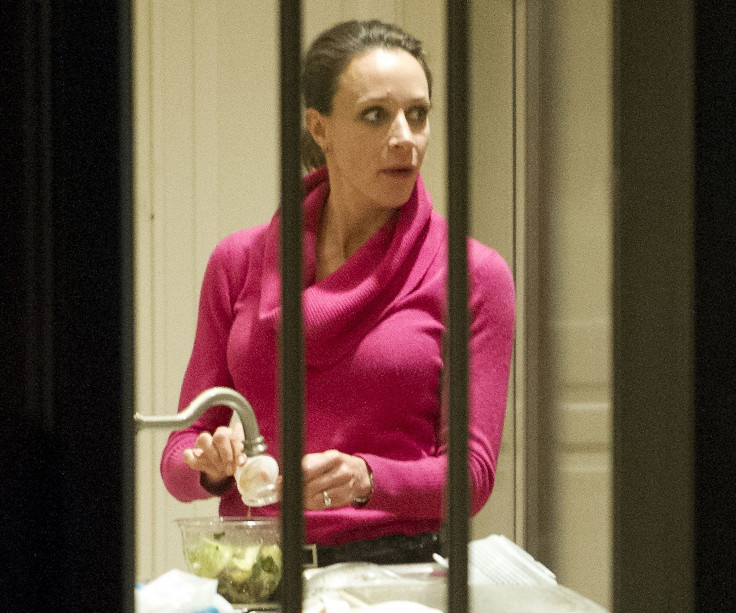Who Is Paula Broadwell? 5 Things To Know About The David Petraeus Affair

Nearly five years after her name dominated headlines, West Point and Harvard University graduate and former military officer Paula Broadwell thrust herself back into public view Thursday.
Great Q&A w/ @paulabroadwell by @emilyjanefox https://t.co/9QHVJwdHoo
— David Friend (@DavidMFriend1) December 8, 2016
Her interviews with CBS and Vanity Fair came less than two weeks after David Petraeus, with whom she had an extramarital affair as she wrote his biography, met with President-elect Donald Trump to discuss the possibility of the former Central Intelligence Agency director and four-star general taking on the role of secretary of state in Trump’s cabinet. Read on for a lowdown—or refresher—on what became known in 2011 as the Petraeus scandal.
The Book
The summary on “All In: The Education of General David Petraeus,” according to Barnes & Noble and Amazon, boasts that Broadwell was “afforded extensive access by General Petraeus” and “hundreds of hours of interviews” with the former commander of U.S. forces in Afghanistan. As part of her promotion of the book, released in January 2012, Broadwell embarked on a high-profile publicity tour, most notably stopping at the Daily Show, where she told then host Jon Stewart about how she began interviewing Petraeus on runs together, that method being “the foundation of our relationship.”
How The Scandal Became Public
After Gen. John Allen began receiving threatening emails from an unknown source regarding socialite and former South Korean honorary consul Jill Kelley and her husband, who later received threatening emails themselves, the Federal Bureau of Investigation began looking into possible cybersecurity vulnerabilities at the Tampa base where Kelley was volunteering.
The investigation, which named Broadwell as the source of the threatening emails, unearthed private email correspondence between Petraeus and Broadwell, as well as flirtatious correspondences between Kelley and Allen. When Petraeus and Broadwell’s affair became public, the then CIA director resigned, citing his “extremely poor judgment, both as a husband and as the leader of an organization such as ours” in a letter to his staff.
What Happened To Petraeus
Three days after President Barack Obama’s re-election in November 2012, he accepted the scandalized CIA director’s resignation. In June 2013, Petraeus joined the KKR Global Institute, an investment firm based in New York City, and now serves as its chairman. On Nov. 28, he met with Trump to discuss his next possible career move.
Mishandling Of Classified Information
In April 2015, Petraeus pled guilty to the misdemeanor charge of mishandling classified information and received two years of probation and a fine of $100,000.
Trump has faced widespread criticism for considering Petraeus an option for the position of secretary of state, after he spent the campaign lambasting Clinton for a similar, though far less serious offense, for which she was not indicted.
When FBI director James Comey testified before the House Oversight and Government Reform Committee in July over a scandal involving Hillary Clinton’s use of a private email server, which may have left classified materials vulnerable to hackers, Rep. Elijah Cummings (D-Maryland) questioned him as to whether Petraeus was unfairly punished, compared to the former secretary of state.
“No, it’s the reverse,” Comey answered, adding that the Petraeus lied to the FBI about his handling of the classified materials during the investigation.
What Happened To Broadwell
The former officer was not charged with cyber-stalking or harassment of Kelley, but was still waiting for approval of her Army resignation paperwork, she said in a Dec. 8 interview with CBS, and had been denied a position at a major bank—unlike Petraeus. When asked how she felt about the former CIA director’s possible appointment to a cabinet position, she defended his merits, but pointed to the unequal outcomes of the affair.
“As I woke up to the news, you know, it was a bit of a shocker that he was being considered for a cabinet position, and I was—I was both shocked that I’m still in this tenuous position, and yet happy because I think he should be able to go on with his life,” she said. “He’s earned it, and so should his family. But then it begged the question of, ‘Why shouldn’t I be able to go on?’”
© Copyright IBTimes 2024. All rights reserved.






















